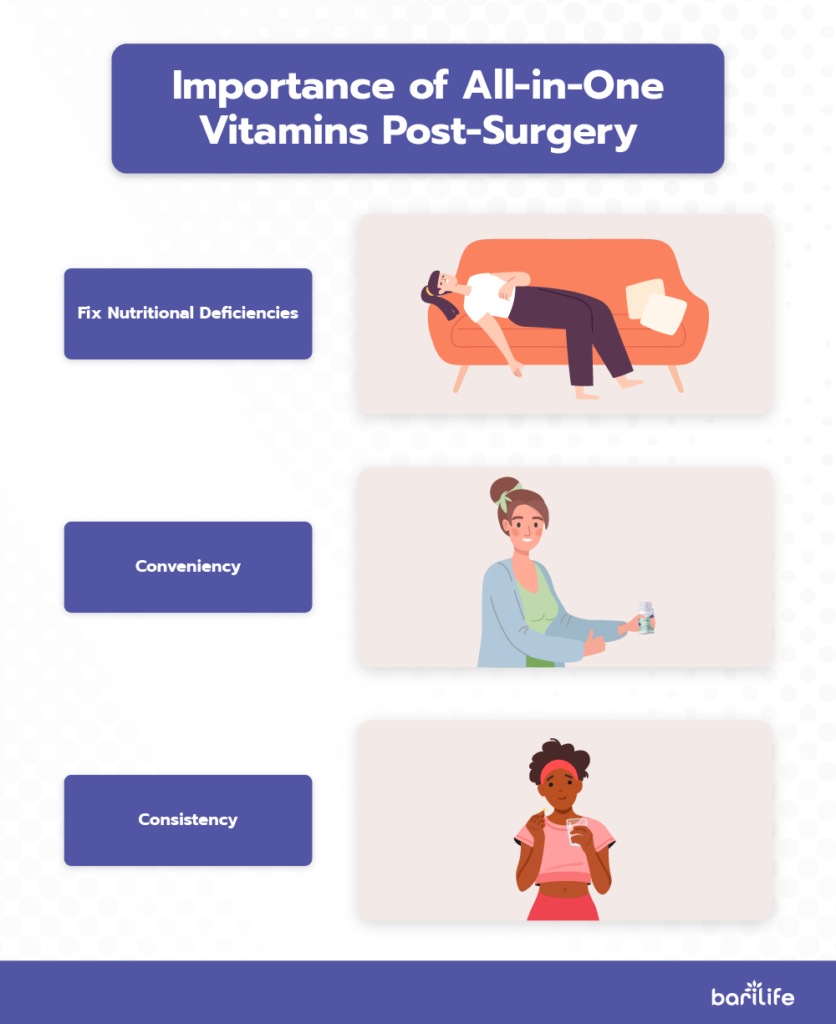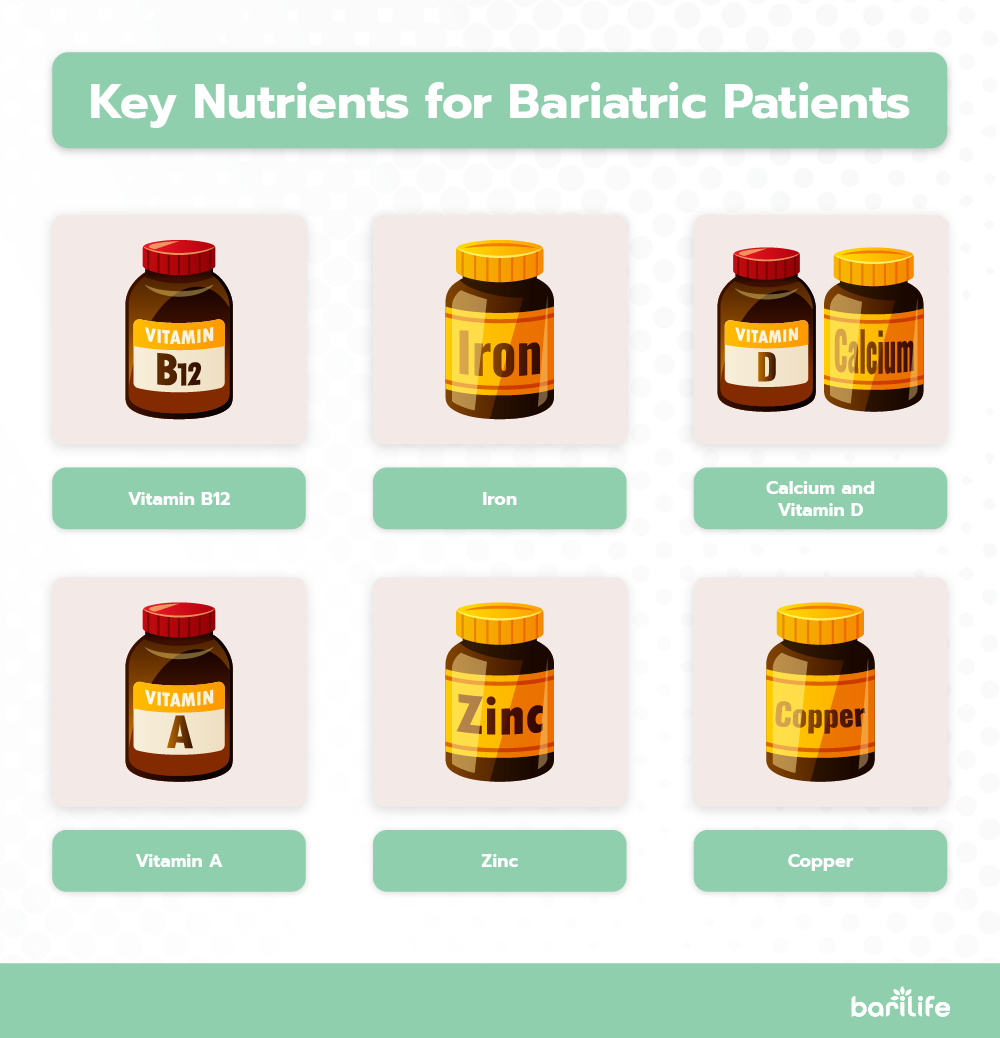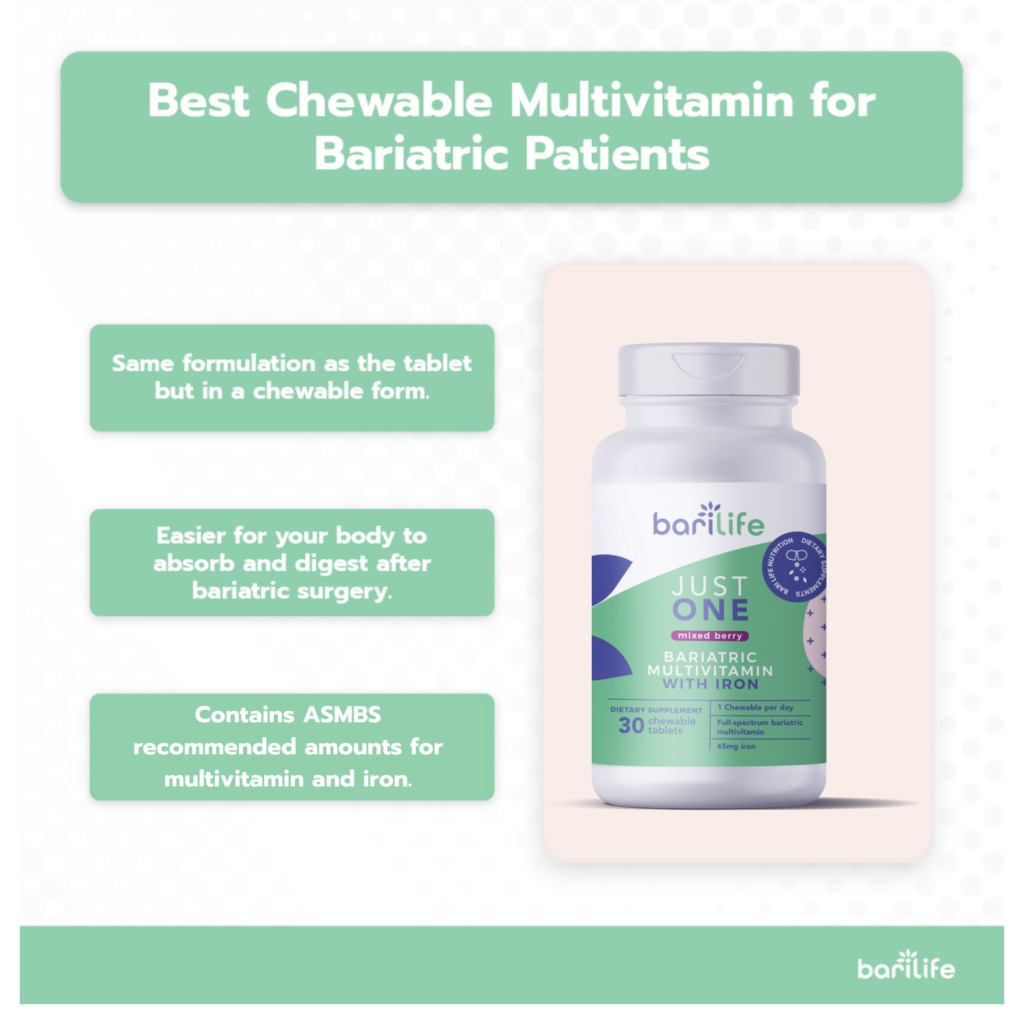Key Takeaways
- After bariatric surgery, it’s important for you to take vitamins like B12, iron, calcium, and vitamin D to maintain your overall health.
- An all-in-one vitamin is a great option to fulfill your daily nutritional needs without having to manage several supplements.
- Your bariatric healthcare team will use regular blood testing to check for deficiencies and give you personalized guidance.
Table of Contents
Choosing the best bariatric vitamins after bariatric surgery is crucial for your post-surgery health.
Because your plate is a little smaller these days and your digestive system has some alterations, it can be difficult for your body to absorb enough essential vitamins.
Taking an all-in-one vitamin formulated for people who have undergone bariatric surgery is a convenient and healthy way to meet your nutritional needs.
Here’s a comprehensive guide to the importance of an all-in-one vitamin after surgery, the key nutrients you need, answers to common questions, and expert recommendations.
Importance of All-in-One Vitamins Post-Surgery
After bariatric surgery, your body’s ability to absorb nutrients reduces significantly a serious bariatric surgery vitamin deficiency.
In fact, studies show that nutritional deficiencies are very common for people who have undergone bariatric surgery. For example, iron deficiency, expressed by low serum ferritin, occurs in more than 30% of patients after 5 years from surgery
Lacking key vitamins and minerals can start to affect your overall health, making you tired and even affecting your hair, immune system, skin, and bones.
All-in-one bariatric vitamins are specifically designed to address this challenge. They often contain essential components like B vitamins, iron, calcium, and vitamin D.
Not only are these all-in-one vitamins comprehensive, they are also convenient. You won’t have to worry about vitamin bottles cluttering up your counter and swallowing a handful of vitamins each day.
Experts have also found that simplifying vitamin intake to a single daily supplement can help you remain consistent.

Key Nutrients for Bariatric Patients
Experts have found several common nutritional gaps in people who have undergone bariatric surgery.
- Vitamin B12: Changes to your stomach acid after surgery make it more difficult for your body to absorb vitamin B12. However, this vitamin is crucial for your nerve health and the production of red blood cells.
- Iron: Iron deficiency after bariatric surgery is very common and can cause you to feel cold, weak, and lacking energy to do normal daily activities. You can also become anemic.
- Calcium and vitamin D: Calcium and vitamin D are essential for your bone health. Calcium also depends on vitamin D for bariatric patients for absorption. Without enough calcium and vitamin D, you are at risk for developing weak bones, or osteoporosis.
- Vitamin A: Your body has a hard time absorbing vitamin A after bariatric surgery. However, you need a good source of vitamin A for your vision and hair health.
- Zinc: Zinc is important for preventing hair loss after bariatric surgery.
- Copper: Copper tends to be low in people after bariatric surgery. You need steady levels of copper for your nerve health.

FAQs on Bariatric Vitamins: Common Concerns Addressed
Here are several common questions we get asked about bariatric vitamins:
Why do I need specialized bariatric vitamins?
Specialized bariatric vitamins are formulated to meet the unique needs of people who have undergone bariatric surgery. They tend to have higher amounts of vitamins and minerals to counter the body’s decreased ability to absorb them.
What forms of vitamins are best for bariatric patients?
The best forms of vitamins for people after bariatric surgery are chewable and liquid vitamins as they tend to be easier to digest and absorb.
Do I need to take bariatric vitamins for the rest of my life?
Yes, lifelong supplementation is typically necessary after bariatric surgery to prevent nutrient deficiencies. Regular blood tests and consultations with your bariatric healthcare team can help you adjust your regimen as needed.
Can I take all my vitamins at once?
Some vitamins and minerals need to be kept separate. For example, it’s not best to take iron and calcium together. Your bariatric healthcare team can give you personalized guidance on the best times to take your supplements.
Expert Recommendations for Daily Intake and Usage
Rather than a one-size-fits-all blanket statement on daily suggestions for vitamin intake, experts recommend a personalized approach.
Regular visits with your bariatric healthcare team for blood tests, helps identify any deficiencies.
Additionally, some may wonder, can anyone take bariatric vitamins? Having these results allows your health provider to tailor your supplements and diet accordingly.
Bari Life All-in-One Bariatric Multivitamin: A Top Contender
Bari Life’s once-daily bariatric multivitamin with iron, Just One, stands out as an option that checks all the boxes.
It was designed specifically to meet the needs of people who have had bariatric surgery and need higher levels of nutrients like vitamin D, vitamin B12, iron, and vitamin A, zinc, and copper.
Happy customers frequently report an increase in their energy levels and overall health when taking this vitamin. They also love the simplicity of only taking one vitamin and that it doesn’t make them feel nauseous.
It is important to note that this all-in-one vitamin does not contain calcium, as iron and calcium need to be taken separately. Your health provider may suggest taking a separate calcium supplement to help you meet your daily intake needs.
Why not try our bariatric calcium chews? They give you 3 simple Calcium sweets you can chew each day to get all the Calcium you need.

Best Chewable Multivitamin for Bariatric Patients
Bari Life’s bariatric vitamins chewable Just One is the same formulation as the non-chewable tablet but in a chewable form. If swallowing vitamins is not your thing, this chewable vitamin is a great option for you.
You also may find that the chewable vitamin is easier for your body to absorb and digest after bariatric surgery.
Customers rave about the delicious mixed berry flavor and that they don’t feel nauseous when taking it.
Similar to the tablet, the chewable multivitamin does not contain calcium. Your health provider may ask you to take a separate calcium supplement to meet your daily calcium needs.

Conclusion
After bariatric surgery, proper nutrition through supplementation is vital. A vitamin like Bari Life Just One Daily Multivitamin helps fill common nutritional gaps, ensuring key vitamins like B12, iron, calcium, and vitamin D are absorbed. While it offers convenience with a single daily dose, some nutrients like calcium may need separate supplementation due to absorption issues. Regular check-ups with your healthcare provider ensure your regimen stays on track for long-term health and recovery.
If you want to learn more, why not check out these articles below:
- Best liquid vitamins for bariatric patients
- Prenatal vitamins vs Bariatric vitamins
- Do Vitamin patches work for bariatric patients
- Best vitamins for hair loss after bariatric surgery
- Why no gummy vitamins after bariatric surgery?
- Best vitamin D for bariatric patients
- What are bariatric vitamins?




What are your tips and tricks to post-bariatric success?